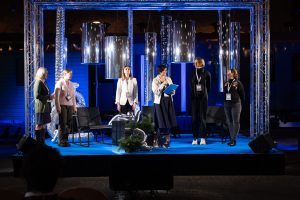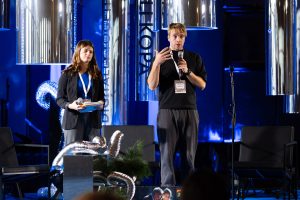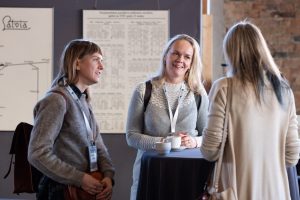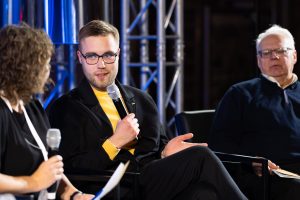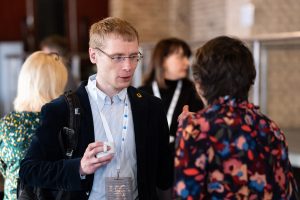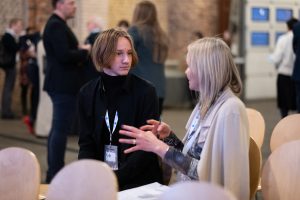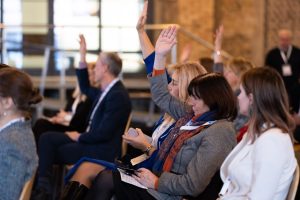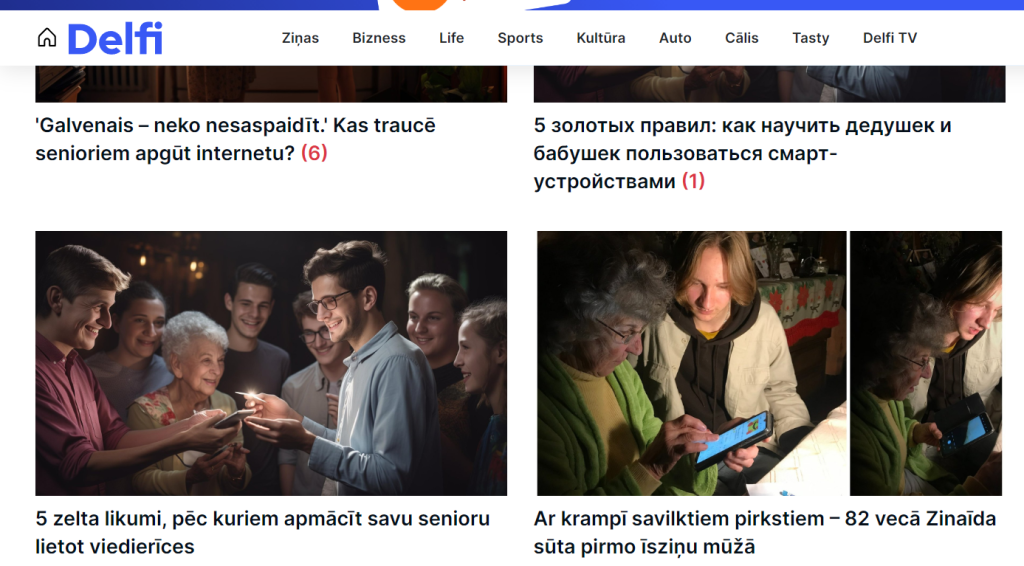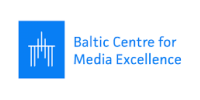Digitally Together! in Latvia
Amid the rising threat of disinformation and online fraud, it’s crucial to safeguard the most vulnerable individuals in our society. It’s widely known that younger generations have grown up with digital technology, while older generations are often less familiar with it and may be at risk of mistreatment.
Therefore the Baltic Centre for Media Excellence (BCME) has initiated a project to improve the digital competency of both young people and the elderly (WP1, T4.3). The project, called “Digitally Together!”, was co-financed by the Society Integration Fund of Latvia. To achieve the goal of this project, BCME has invited students from schools and universities, teachers, librarians, and experts to participate.
The Executive Director of BCME, Gunta Sloga, believes that the information space is vulnerable to disinformation and deception, especially under hybrid warfare conditions. It’s not just Russia or China that flood digital platforms with disinformation, but different players at home use public splits and deception. Therefore, understanding the various groups of society on these issues is crucial. Intergenerational cooperation is also vital for building a resilient information space.
Over 50 applications were received from students, teachers, and librarians to participate in the project’s online classes on 24 and 25 November 2023. During these classes, young people were taught about digital skills, media literacy, and intergenerational collaboration. This training allowed them to become volunteers for seniors in their families and communities, teaching them about media literacy and digital skills. Additionally, participants were able to develop joint projects in the field of social sciences to recognize seniors’ media usage habits.
The six-hour training program was provided online and through teaching materials and records. 44 participants from over 30 educational institutions enrolled in the program, and many of them shared their own stories and photos, describing how they have helped seniors.
As the EDMO/BECID activities continue, young people involved in the project will have opportunities to continue their volunteering activities and enhance their knowledge of media literacy and digital skills.
The training program for young people consisted of media literacy and digital skills experts like Klinta Locmele (“Managing digital environments wisely”), Liva Kalnaca (“Bridging the digital divide: How to assist grandparents to use Google and send pictures”), and Girts Edvards Stepins (“Effective technologies for seniors – educational tips for working with non-tech experts”).
According to anonymous feedback from the participants, the training was very useful and timely. Some of the quotes from the feedback include: “I found it most helpful to learn how to explain program features to seniors, how to explain deep fakes, how to record a screen for seniors to view later, and the opportunity to create a digital term dictionary for seniors to navigate the internet jungle.” Another participant stated, “I believe this event is crucial due to the increasing use of technology and the aging population. It is essential to ensure that seniors feel comfortable and safe using technology, and I am happy to be one of those who can help them.”
Before the start of the training, an online event was held on November 16, 2023. Experts and project managers informed the participants about upcoming activities and shared best practices for promoting media literacy and digital skills for seniors and young people across the Baltics.
On 14th December 2023, the “Digital Together!” forum marked the conclusion of a project. The forum focused on improving intergenerational cooperation, particularly in the areas of digital and media literacy. The event featured several speakers from the Baltic region, including Anna Broka (Latvia), who talked about “How to Build a Generational Bridge: Communication, Participation, and Accountability.” K. Locmele (Latvia) spoke on “How to Promote Senior Media Literacy,” while Marcus Sirp and Stefan Allev (Estonia) presented “Digimentors,” a personalized assistance program for seniors. Rimgaile Kasparaite and Patricia Lenchiauskiene (Lithuania) also spoke about “Intergenerational media literacy in project Digires” among other topics. The event brought together young people, seniors, and experts to discuss and share ideas on bridging the generational gap.
A dedicated section was operated on the Delfi LV news portal between November 1 and December 31, 2023. The section provided information on the project’s progress and included articles on youth and seniors’ cooperation, media literacy, and digital security. This helped to reach a wider audience, with a total of 25,375 visits to the eight publications that aimed to improve digital skills and intergenerational collaboration.
The articles covered various topics such as seniors’ priorities in digital skills, teenagers training their relatives in technology, barriers to seniors learning the internet, and tips for training seniors to use smart devices. In one of the articles, an 82-year-old woman was featured who successfully sent her first text message. Overall, the section aimed to promote digital literacy and awareness among different age groups while breaking down the barriers to technology.
Various activities have taken place in Estonia and Lithuania to enhance the digital competence and media literacy of young people and seniors. After evaluating the project in Latvia, it was found that it had been successfully implemented within the given time frame and available funding.
Experts have emphasized the need to view digital skills and media literacy together as a long-term process that requires expert work, studies, methodological materials, and other measures. Therefore, it is essential to continue the work by seeking funding and experts in cooperation with state institutions, schools, and libraries. These have become community centers and digital skills promoters in Latvia.



